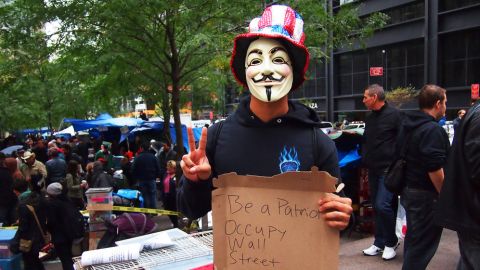The Power-Hungry Elite Aren’t Who You Think They Are

“Such a waste of talent!” sighs Kevin Spacey’s character Francis Underwood during one of his signature direct-to-camera asides in the Netflix series House of Cards. Underwood is describing a lobbyist who “chose money over power,” a mistake that “nearly everyone makes” in Washington. Underwood elaborates:
“Money is the McMansion in Sarasota that starts falling apart in 10 years. Power is the old stone building that stands for centuries. I cannot respect someone who does not see the difference.”
What’s the Big Idea?
The crafty Underwood represents the kind of consummate Washington power broker that Charles Murray describes as such: He may not make as much money, but nonetheless yields “a lot more power than a lot of billionaires do.” Murray, the author of Coming Apart: The State of White America, 1960-2010(now out in paperback), told Big Think in a recent interview that he was about halfway through the writing of his most recent book when the terms 99 percent and one percent “became a big deal” in American political discourse.
These terms, of course, were popularized by the Occupy Wall Street movement and used to describe the large gap in income equality in the country. “To me that’s not the real dividing line,” says Murray. Consider this scenario:
Suppose you have a guy who’s made 35 million bucks with a chain of used car lots. Occupy Wall Street was not against that guy and his 35 million bucks. They were talking about an elite that runs the country that seems to have a lot of power over other people’s lives and are not sufficiently accountable. That doesn’t include just rich people, it’s a particular kind of person.
In other words, as Murray sees it, the elite are not necessarily the wealthy but the people who run the country. These people live in almost a different world from the rest of us. Murray defines this narrow elite as the 100,000 or so people who have an outsized influence on the nation’s culture, economics and politics.
They’re the CEOs of the most important industries, such as Hollywood and Wall Street. They are bureaucrats in Washington. So what are the characteristics of this narrow elite?
Murray deliberately eschews the kind of controversy he generated with his 1994 book The Bell Curve (which civil rights lawyer Barack Obama at the time cited as evidence that “white America is ready for a return to good old-fashioned racism as long as it’s artfully packaged.”) by focusing Coming Apart on white America. While this approach is also seen as deeply problematic by many other social scientists, Murray studies two classes of white America, groups he says are divided by a cultural inequality that dwarfs economic differences.
Murray portrays the elites as an out-of-touch tribe that not only lives in bigger houses, but also enjoys amenities that are completely inaccessible to the rest of the country. For instance, the elites have support staff in their personal and professional lives. They also have flexible work schedules, enabling a markedly different lifestyle.
Elites don’t watch a lot of TV. When they do, they’re watching Downton Abbey or Madmen, not America’s Got Talent. They also read more. They’re healthier, and possess a near-universal aversion for domestic mass market beer. “You will never see Budweiser in the refrigerator of a member of the new upper class,” Murray tells us.
Now, you might be thinking that Murray is describing you, sans support staff. And if you share the cultural tastes he describes, you might think he is passing judgment, which is really not his point.
The average television set in the United States is on 35 hours a week, Murray points out, and “that’s probably too much.” However, the people watching all of that television are getting something that the elites are not: “exposure to our popular culture in very large doses.” In other words, while there is nothing particularly virtuous about watching TV 35 hours a week, Murray says:
When you have that kind of divergence in that single behavior, you have part of the reason that you have an ignorance of, and oftentimes a disdain of, mainstream America by the new upper class which is very problematic in terms of the future of the country.
What’s the Significance?
Murray sees the stratification of American culture as the result of an erosion of values, the very values, in fact, that created great prosperity throughout much of the 20th century. In a forthcoming post, we will explore Murray’s argument about how white working class Americans are becoming less industrious. As for the elites, they have great staying power because of their education and the corresponding skill sets they possess that put them at a great advantage in the high tech economy.
“How can I make life wonderful for people with high IQs?” If God had asked himself that question, Murray says, his answer may very well have been the America of yore. If you were smart you had a very good chance of getting ahead. However, Murray says the economy has shifted in a way that now rewards “simple, raw brainpower in a way that it never did before.”
To illustrate this point, Murray suggests you consider the example of a peer you knew in high school or college, “someone who has very high visual spatial skills, mathematical skills, and is a complete social klutz.”
What opportunities would such an individual have in the early part of the 20th century? Maybe he could be a math teacher. But he probably wouldn’t have even made a very good math teacher, Murray says.
Today, however, Murray says:
You can take that same person with those same really inferior personal skills and he can juggle offers from Google and Microsoft if he’s a hotshot programmer, as many excellent mathematicians are. Or he can be considering going to work for one of the giant investment firms which can realistically promise him wealth beyond his wildest dreams ever.
“Life is just wonderful for really smart people now,” Murray concludes. “And as a result of that, the new upper class is infested with them and they live together and they reinforce each other’s opinions.” That also means that our country suffers because, as Murray says, the new elites “don’t really have much of a clue about what the rest of the country is like.”
Image courtesy of Shutterstock
Follow Daniel Honan on Twitter @Daniel Honan





